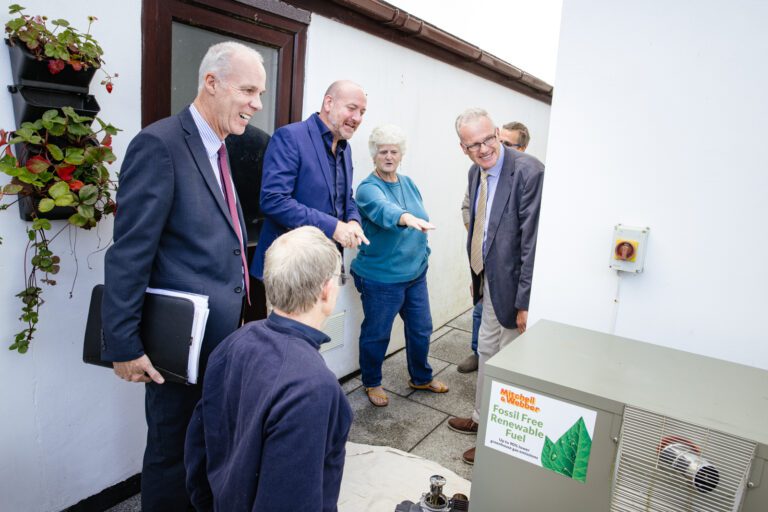
“The Government must deliver on promises made to rural communities.”
On 26th October 2023, the Energy Act received Royal Assent and became an official act of parliament. Within the Act, Section 159 contains legislation that, if invoked by the Secretary of State for the Department for Energy Security and Net Zero (DESNZ), would create the renewable liquid heating fuel obligation and pave the way for the introduction of Hydrotreated Vegetable Oil (HVO) and other renewable fuels for home heating.
This piece of legislation is very similar to the Renewable Transport Fuel Obligation created by the last Labour government in 2005 and was introduced with the promise of a consultation on the technical details in a few months and certainly within one year. The legislation received cross-party support in Parliament, including from the Labour Party, which now forms the new government.
Ken Cronin, CEO UKIFDA explains: “While acknowledging that there is a new government, rural off-the-gas-grid households and businesses were effectively promised a consultation within a year, but so far, the consultation has not been forthcoming. To highlight this oversight, a new Future Ready Fuel campaign has been launched for the Energy Act’s first anniversary. We are calling for the legislation to be invoked as soon as possible and for the consultation to be undertaken. In support, we’re asking UKIFDA distributors, OFTEC registered technicians and home heating oil consumers to share this message with their local MP.”
Proven solution
“We know HVO is a viable solution. As part of a nationwide demonstration project, around 150 properties, including homes, schools, churches, and village pubs, were converted from kerosene to HVO. It’s been an overwhelming success. Carbon emissions were reduced by 88%, and the conversion only required a small, low-cost modification to the boiler, which only took a few hours.
“For rural off-grid households who can’t afford a heat pump or would need to undertake significant disruptive changes to their property for the technology to work effectively, HVO is an ideal alternative. Our survey of oil-heated households has shown over 90% support for this approach. Fundamentally, it’s about giving consumers a choice.
“We all want to play our part and transition to low-carbon heating, but the options available must be affordable and practical.”
For more information and to support the campaign, visit www.futurereadyfuel.info.
Cornish Village HVO pilot scheme results show the way
The small Cornish village of Kehelland is the unlikely setting for an important demonstration project that began 3 years ago this month, and has been leading the way in rural domestic heating decarbonisation.
Since it began, we have regularly followed its progress, covering the residents’ successful journeys to low carbon heating. Now, 3 years on, we explore the impact it has made both on the community and the environment.
Similarly to hundreds of rural villages in the UK, Kehelland is not connected to the gas grid and, prior to the rollout of the HVO pilot, its residents, primary school and church all relied on kerosene-fuelled boilers for their heating.
Scorrier-based Mitchell & Webber has supplied conventional heating fuel to most of the village for years. Keen to test HVO as an alternative fuel, the distributor met with residents to outline the proposed pilot scheme to trial its use as an affordable solution to decarbonise domestic heating and accelerate the UK’s journey to net zero,
Many of the residents were aware of the vital need to decarbonise their heating, but had found the cost of achieving an effective heat pump installation in their older properties prohibitive.
Mitchell & Webber had installed and delivered HVO to the first UK property in Scorrier in November 2020, and it proved so effective that residents were keen to come on board. Excited by the proposed decarbonisation solution, HVO was rapidly rolled out throughout the village, with the trial beginning in November 2021.
Impacts
We caught up with John and Robert Weedon, Directors at Mitchell & Webber, to find out more about the impacts of this scheme over the three years it has been running.
“We wanted to look at a village scenario,” John said, “with a school, a church, and at least 25 homes to have a feel of scale. Kehelland was also a village with different types of properties, Georgian houses with solid granite walls, to pre-war right up to modern bungalows.
“We have demonstrated that HVO reduces 90% of CO2 emissions, compared with kerosene, and works in all types of houses and all types of boilers. It’s non-toxic, biodegradable and not carcinogenic.
Recent analysis of the environmental impacts of the use of HVO have shown that, since 2021, the introduction of HVO for heating has saved 253 tonnes of carbon emissions in Kehelland alone, and John says: “It is a clear demonstration of what can be done right now! For many people who can’t afford to spend the thousands of pounds needed to make their homes suitable for heat pumps, it’s about offering a green alternative, greater choice and a solution deliverable immediately.
“We just need government to back this move away from fossil fuels.”
Andrew Geake, the environment and climate change advocate with the Methodist Church for the South West Peninsula District, oversaw Kehelland church switching to HVO following the previous trial church at Stithians and said: “There are a lot of rural churches and chapels which are often not connected to the main for heating, gas, electrics and sewage. Heat pumps would not be feasible for many of these old and often listed buildings, and would not be efficient as churches are only used sporadically and our existing controls allow any user to have heating for a certain period and on demand which is essential.”

The Methodist Church recently set out its aspirations to become net zero by 2030 which is also what prompted the Kehelland church to look at HVO to help to achieve that at its level. “It’s about being a pragmatic environmentalist,” Andrew said, “And without this HVO solution, there would be a disastrous impact on our progress as a carbon neutral church that would throw us back decades!”
Government needs to act now
More recently the new MP for Kehelland, Perran Moon, has been hosted by Mitchell & Webber to hear about the success of the pilot. Other Cornish MPs are also keen to visit this example of domestic heating decarbonisation and a contingent of officials from Cornwall Council will also be visiting in December.
In an extension to the trial, a number of customers have adopted a 20% HVO blend which they have been using for over 12 months, whilst the school , church and other residents remain on the original 100% HVO. In all cases there have been no issues, with customers reporting a very positive experience of their use of the sustainable fuel
At present there is a 20% VAT rate and fuel duty of 10p per litre on HVO but zero duty on heating kerosene and only 5% VAT. Industry trade associations UKIFDA and OFTEC are calling for government to bring HVO in line with kerosene. Mitchell & Webber, are hoping that the results from the Kehelland trial will support the industry calls and persuade the government of the need to remove this disparity.
“It won’t even cost the government anything to do it. That’s the beauty of it,” Robert commented. “We’re not anti-heat pumps – every solution that contributes to decarbonisation is needed. We just believe consumers should be able to choose the best solution for their property and HVO is a solution that can make a significant and immediate difference across rural communities.
“We are backing the calls for this renewable fuel to have the same duty rate as heating oil and for the consultation from the Energy department to start straight away so all off-grid constituents can benefit!”
Images supplied by UKIFDA / Mitchell & Webber
